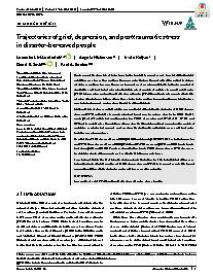Trajectories of grief, depression, and posttraumatic stress in disaster‐bereaved people
1 Background
Previous latent trajectory studies in adult bereaved people have identified individual differences in reactions postloss. However, prior findings may not reflect the complete picture of distress postloss, because they were focused on depression symptoms following nonviolent death. We examined trajectories of symptom‐levels of persistent complex bereavement disorder (PCBD), depression, and posttraumatic stress disorder (PTSD) in a disaster‐bereaved sample. We also investigated associations among these trajectories and background and loss‐related factors, psychological support, and previous mental health complaints.
2 Methods
Latent class growth modeling was used to identify distinct trajectories of PCBD, depression, and PTSD symptoms in people who lost loved ones in a plane disaster in 2014. Participants (N = 172) completed questionnaires for PCBD, depression, and PTSD at 11, 22, 31, and 42 months postdisaster. Associations among class membership and background and loss‐related variables, psychological support, and previous mental health complaints were examined using logistic regression analyses.
3 Results
Two PCBD classes emerged: mild (81.8%) and chronic (18.2%) PCBD. For both depression and PTSD, three classes emerged: mild (85.6% and 85.2%), recovered (8.2% and 4.4%), and chronic trajectory (6.2% and 10.3%). People assigned to the chronic PCBD, depression, or PTSD class were less highly educated than people assigned to the mild/recovered classes.
4 Conclusions
This is the first latent trajectory study that offers insights in individual differences in longitudinal symptom profiles of PCBD, depression, and PTSD in bereaved people. We found support for differential trajectories and predictors across the outcomes.
In: Depression & Anxiety, eISSN 1520-6394 | 37 | 1 | 35-44
https://doi.org/10.1002/da.22850


